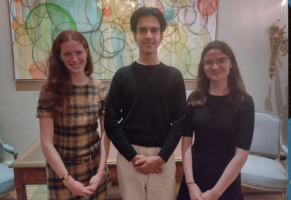
By Victoria McKinley-Smith
‘The beauty of literature lies not in its ability to provide answers, but in its capacity to ask thought-provoking questions.’ – Edmond de Goncourt
In the realm of literature, the journey of exploration often proves more enriching than the destination of resolution. The timeless wisdom of Edmond de Goncourt (one half of the duo who founded the Prix Goncourt) still echoes in the corridors of literary judgement, aiding us as the students of the Oxford reading group in discussing and deliberating the four novels presented for the student edition of the 2024 Choix Goncourt; Veiller sur elle by Jean-Baptiste Andrea, Triste Tigre by Neige Sinno, Sarah, Suzanne et l’écrivain by Eric Reinhardt and Humus by Gaspard Kœnig.
After reading all four novels and meeting for our final Oxford deliberation, our minds were largely made up, with Jean-Baptiste Andrea’s Veiller sur elle taking the top spot. Our initial judgement was based on personal preference and gut instinct, a vital foundation of any opinion-based process, before we delved into the literary merits and shortcomings of each novel. As a group we enjoyed following the life of the protagonist and sculptor Mimmo, set against the backdrop of 20th-century Fascist Italy, interspersed by idyllic depictions of the Italian landscape and well-researched references to art and sculpture. We were equally taken by the other three novels which discussed poignant and relevant contemporary issues such as climate change, capitalism, and extinction rebellion in Gaspard Kœnig’s Humus, psychological turmoil and relationships in Sarah, Suzanne et l’écrivain, and sexual violence against a child in Neige Sinno’s Triste Tigre.
Our reading and discussion culminated in an inter-university deliberation, which Reuben Micu and I attended on the 22ndMarch at the Institut Français, presided over by Michèle Roberts. Whilst there, each pair of delegates (representing 15 UK universities) was given the opportunity to discuss the opinions from our respective reading groups, defending our choices whilst considering the arguments presented by other students from across the country. After many hours of enthralling discussion, it was decided that Neige Sinno’s harrowing yet powerful account of her sexual abuse as a child would be the winner.
Sinno’s evocative work of autofiction explores the psychological trauma experienced by victims of sexual abuse and the complicated relationship between the abuser and victim, particularly when abuse takes place within the family unit. This is supported by various literary intertexts from other female writers such as Virginia Woolf, Toni Morrison and Virginie Despentes, whilst simultaneously criticising the idea of literature as a healing and redemptive force. Most evocative was Sinno’s struggle to write about the unspeakable and the difficulty in sharing her experiences with her own daughter and mother, making it a worthy winner.
The result was announced not at the restaurant Drouant, as is customary in France for the official Prix Goncourt, but the magnificent Résidence de France at the invitation of Ambassadrice Hélène Duchêne. The ceremony involved readings from each of the four shortlisted novels and recorded messages from each of their authors before Triste Tigre was announced as the official winner of the 2024 Choix Goncourt.
Overall, the experience was fantastic. Judging such a diverse collection of literature is no mean feat, as it involved several criteria such as genre, literary style, audience and characterisation. As a first-year student, this was my first real introduction into the world of contemporary French literature, unrestrained by decades of scholarly research and academic publications. This proved both daunting and liberating at the same time, with each novel presenting its own unique journey, inspiring us to explore the intricacies of human experience through the lens of fiction.